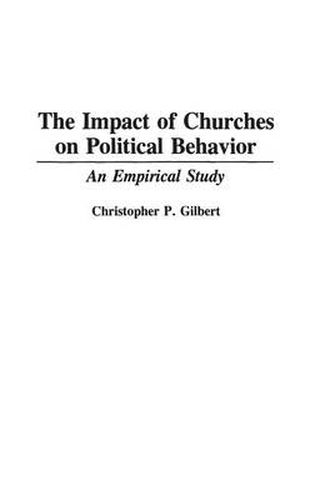Readings Newsletter
Become a Readings Member to make your shopping experience even easier.
Sign in or sign up for free!
You’re not far away from qualifying for FREE standard shipping within Australia
You’ve qualified for FREE standard shipping within Australia
The cart is loading…






This volume applies well-known and highly regarded data in a new way and analyzes the impact of churches today on American political attitudes and behavior. These important findings measure how churches serve as political and social contexts and affect voting behavior; party identification; and the positions that local congregations and their membership take on abortion, public prayer, the economy, defense, support for minorities, and other issues. Political scientists, sociologists, and religious scholars will find these new interpretations of survey data clear, well-supported, and carefully qualified.
This study of the role of religion in political decision making uses National Election study data, county-level data and the South Bend Community Study. Chapter 1 provides a general overview and introduction. Chapter 2 fills out the discussion about the nature of religious and social contexts and their relationship to churches and their members. These early chapters also define the design and research methodology and describe earlier research on the subject. Chapter 3 considers county-level data and changes relation to religious environments and individual behavior. In chapter 4, findings relating to voting and party identification are covered. Chapter 5 considers voter turnout, attitudes on public policy issues, economic expectations, views on issues relevant to the church. Chapter 6 evaluates church contexts and individual self-evaluations and perceptions about the impact of social contexts. The political influence of church discussion partners is the focus of chapter 7. The final chapter points to the political relevance of churches as contexts and summarizes some of the theoretical conclusions derived from the empirical study. Appendices provide the methodological material about variables and coding schemes needed for understanding the design of the work. A bibliography points to related studies of note.
$9.00 standard shipping within Australia
FREE standard shipping within Australia for orders over $100.00
Express & International shipping calculated at checkout
This volume applies well-known and highly regarded data in a new way and analyzes the impact of churches today on American political attitudes and behavior. These important findings measure how churches serve as political and social contexts and affect voting behavior; party identification; and the positions that local congregations and their membership take on abortion, public prayer, the economy, defense, support for minorities, and other issues. Political scientists, sociologists, and religious scholars will find these new interpretations of survey data clear, well-supported, and carefully qualified.
This study of the role of religion in political decision making uses National Election study data, county-level data and the South Bend Community Study. Chapter 1 provides a general overview and introduction. Chapter 2 fills out the discussion about the nature of religious and social contexts and their relationship to churches and their members. These early chapters also define the design and research methodology and describe earlier research on the subject. Chapter 3 considers county-level data and changes relation to religious environments and individual behavior. In chapter 4, findings relating to voting and party identification are covered. Chapter 5 considers voter turnout, attitudes on public policy issues, economic expectations, views on issues relevant to the church. Chapter 6 evaluates church contexts and individual self-evaluations and perceptions about the impact of social contexts. The political influence of church discussion partners is the focus of chapter 7. The final chapter points to the political relevance of churches as contexts and summarizes some of the theoretical conclusions derived from the empirical study. Appendices provide the methodological material about variables and coding schemes needed for understanding the design of the work. A bibliography points to related studies of note.